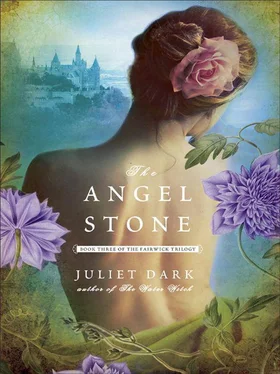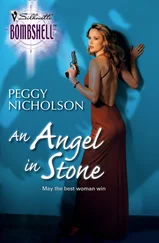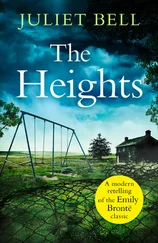The back door opened and William entered, wearing the long nightshirt I’d found for him last night and a blanket tied around his waist like a kilt. I was suddenly aware that I was naked beneath the blankets—and remembered why . Memories of last night came rushing back—the soreness between my legs told me that part hadn’t been a dream. Probably the second time we’d done it hadn’t been a dream, either.
I pulled the blanket up over my breasts, feeling completely abashed. In some ways I’d known this man forever, but in other, more practical ways, I’d met him for the first time only last night. Worst of all, I felt disloyal to Bill.
“Ah, you’re awake!” William said, coming to sit on the stone ledge in front of the hearth. He kept his back to me as he stirred the oatmeal in the pot. Maybe he was also feeling a little shy after our impromptu lovemaking in the middle of the night. Or maybe he’d forgotten …
He turned to me and smiled. “I thought ye might be hungry after … weel, the exertions of last night.” He blushed—or perhaps it was the glow of the fire on his face. He rubbed his chin. “And I found I needed a shave. I’m afraid I’m a wee bit out of practice. My hair never grew in Faerie. What do ye think?” He slid down beside me, taking my hand and holding it up to his smooth shaven cheek. “Do I feel like a beast to you this morning?”
“You’re not a beast,” I told him.
He brought my hand to his lips and kissed it. “I was afraid ye would think I was after how I behaved last night. I promised myself I wouldn’t take advantage of you, and then I ravished you like a wild animal.”
I started to laugh, but, realizing that he was serious, I cleared my throat and pretended it was a cough instead. “As I recall, I did some of the ravishing.”
He grinned. “Aye, I thought so! But then I told myself this morning I must have conjured up that part. I didn’t wish to presume … weel, I feel as if I have known you a long time, but perhaps you do not feel the same for me.”
“I feel as if I’ve known you for a long time, too,” I said. “But … well, I suppose it will take some time before we figure out what we know and what we don’t know about each other, and I’m not sure how long we’ll have.”
His face darkened. “And where will you be off to then?”
“Back home,” I said. “My friends are in danger. I have to find the angel stone and return to save them.”
“Back through Faerie?”
“Yes …” I began.
“But did ye not hear the Fairy Queen’s curse?” he demanded. “She cursed us both. She said if ye ever set foot in Faerie again, she’d pluck out your eyes and heart and replace them with eyes and heart of wood.”
I smiled at the arcane language of the curse, but I felt a chill remembering the Fairy Queen’s blazing green eyes. “When it comes time, I’ll deal with Fiona,” I said with more conviction than I felt. “But first I must find the angel stone.”
“And do you know where to find this stone?”
I admitted I didn’t.
“Weel, then,” he said, his mood restored. “You’d best eat your parritch to keep your strength up. Who knows how long it will take to find one wee stone amongst all the stones in Scotland? But I know where we’ll start. We’ll go and ask my auntie.”
Besides a prodigious collection of vintage underwear and nighties, Mordag possessed no other clothes, so I had to put on my costume from last night. William found an old, much patched and baggy pair of trousers—that he referred to as breeks —which he wore with his nightshirt tucked in and a pair of misshapen clogs he’d found by the back door. No doubt we looked a strange sight as we headed down the road, but there wasn’t anyone to see us.
“Are there always so few people around here?” I asked.
“Well, it’s no’ the Royal Mile of Edinburgh, but there’s usually a farmer taking his wares into town.” He pointed down the road in the opposite direction from where we’d come last night. “This is the way to Ballydoon.”
We headed in that direction, William whistling along the way. Gone was the young man who’d been woken by nightmares.
“You seem happy,” I said, slightly envious that even in borrowed shoes he strode along with less effort than I did.
“Aye, and why not? I’m strolling along a country lane with a beautiful lass on a fine day.”
The sun had burned off the morning mist and was warming the air. A gentle breeze rustled the yellow birch leaves on the side of the road and the purple heather on the hillsides. Magpies chattered in the heather, sunlight glinting off the blue iridescent stripes on their wings. The road climbed at a slow and steady incline. At the top of a rise, we looked down at a small village nestled in the next valley. It was really only a few dozen stone houses around a town square with a market cross and an old church. The ruins of a castle perched on the opposite hill, casting its shadow over the stone houses—the ruin that William had identified last night as Castle Coldclough. It looked like the idyllic Scottish village one might see on the label of a single malt or a tin of shortbread. Or, I thought uneasily, like the bewitched village in that old Gene Kelly movie, which appeared only once every hundred years.
“Brigadoon,” I said aloud.
“Nay, this is Ballydoon,” William said. “At least, it was Ballydoon. There’s something queer about it.”
I gazed back down at the village. It seemed picture perfect to me, like a model under glass or a movie set—and then I saw what he meant.
“Where is everybody?” I asked.
“Aye,” he said. “That’s what I’m wondering. The sun’s been up more than an hour. The market should be full. The farmers should be bringing their wares into town, the good-wives should be washing down their front steps, having a gossip …”
“Do you think they’ve all left?” I asked, staring hard at the stone houses, as if I could pierce their thick walls with the intensity of my gaze.
“Nay,” he said. “There’s smoke coming from the houses. The folks are still there, they’re just staying close to home.”
I noticed now the trails of smoke rising from a few houses.
“What would keep everybody at home?”
“The pest,” he answered in a hushed whisper, as if the word could conjure such a thing. I shivered as though a shadow had passed over us, blocking the warm sunshine and blotting out the beauty of the day.
“William, do you know what year it is?” I asked.
He scratched his head. “Weel, it was 1652 when I left, so if it’s been seven years …”
I ran through my patchy knowledge of British history, trying to remember if there was still plague in 1659. Had there been an outbreak in Scotland at this time? But all I could recall was the date of Defoe’s A Journal of the Plague Year , which took place in 1665. It was certainly possible.
“What should we do?” I asked. “Should we go back to Mordag’s?”
He turned to me for the first time since we’d seen the village. The fear I saw in his eyes was not reassuring, but there was something else—a flash of steel that I recognized from when Bill had gotten angry after Duncan Laird hurt me.
“Perhaps you should go back to the cottage and wait. My auntie who raised me is down there, and I need to know if she’s all right.”
“We’ll go together,” I said quickly. After all, we’d already braved the Fairy Queen and William changing into a monster. “You said she might know something about the angel stone.”
William nodded. “Aye, she’s a wisewoman.”
“Let’s go, then,” I said, putting on a bright smile that felt false on my face. Only as I followed William down the hill toward the village did it occur to me that wisewoman might not refer to his aunt’s sagacity. In these times, it was what witches were called.
Читать дальше








![Twelve Winged Dark Burning Angel - Супер Ген Бога. Том 2 [101-200 главы]](/books/412125/twelve-winged-dark-burning-angel-super-gen-boga-tom-2-101-200-glavy-thumb.webp)
![Twelve Winged Dark Burning Angel - Супер Ген Бога. Том 1 [1-100 главы]](/books/412126/twelve-winged-dark-burning-angel-super-gen-boga-tom-1-1-100-glavy-thumb.webp)


